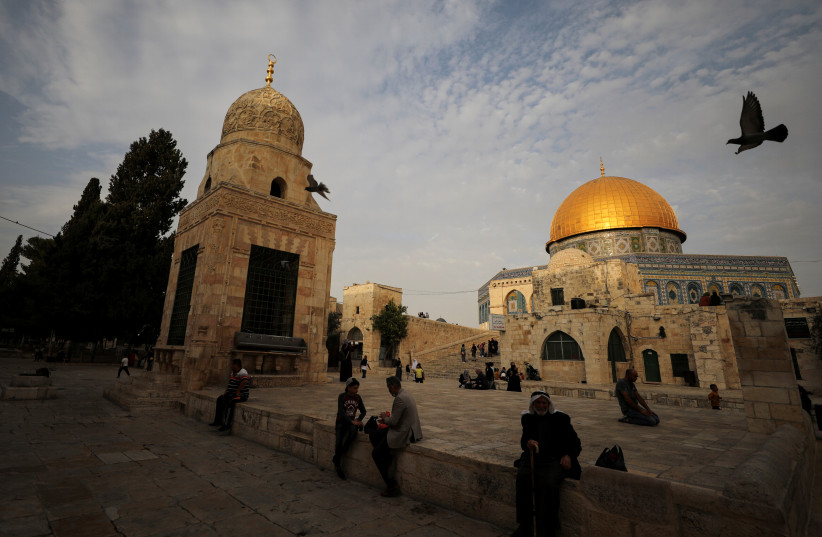Ben-Gvir should be allowed to visit the Jerusalem Temple Mount - comment

One of the greatest mistakes that Israel made was when in 1967 it declared “The Temple Mount is in our hands” but then never took steps to make that true.
One Friday in October 2005, I accompanied then-public security minister Gideon Ezra on a visit to the Old City of Jerusalem. It was Ramadan, and police were on high alert as tens of thousands of Muslims entered the compound for Friday prayers.
A former deputy head of the Shin Bet (Israel Security Agency), Ezra was intimately familiar with the security challenges that the mount posed for the State of Israel. It was there, he warned that day, that a third world war could one day erupt.
That was 17 years ago, and in the years since, Israel has gradually lifted restrictions on Jewish visits and even allows today some quiet forms of prayer at Judaism’s holiest site.
This is the right thing.
Not making the Temple Mount under Israeli control is one of Israel's greatest mistakes
One of the greatest mistakes that Israel made was when it declared in 1967 that “The Temple Mount is in our hands” but then never took steps to make it true. It immediately backtracked, worried of the fallout with the Muslim world, the impact moves on the mount would have on Israel’s relations with Jordan and the possibility that anything that happens there could lead to widespread violence in the West Bank.
When Ariel Sharon visited the mount in 2000, it was widely viewed as a provocation by many Israelis and Western countries. Palestinian leader Yasser Arafat used the visit as an excuse to launch a terrorist war against Israel, known as the Second Intifada.
There is no better illustration of Israel’s hypersensitivity when it comes to the Temple Mount than Mughrabi Bridge, the wooden walkway that connects the Western Wall Plaza and the Temple Mount and is the access point for Jews who wish to visit the site.
The bridge has long been deemed a safety hazard. When it was built in 2007, it was meant to be temporary, until Israel could clear the remains of the old walkway that had collapsed in 2004. Due to claims, though, that Israel was using the work to remove the old walkways, which are all outside the Temple Mount, to dig underneath al-Aqsa Mosque, the work never even started. Does it matter that the claims are false? No. Israel will not move a single rock.
A similar phenomenon happened in May 2021, when Israel decided to cancel the Jerusalem Day parade that was supposed to go through Damascus Gate due to Hamas threats. But even though the parade was canceled, Hamas still sent rockets toward Jerusalem, and the IDF launched Operation Guardian of the Walls in retaliation. Was it right to cancel the parade? It might have bought Israel some credit, but in the end, Hamas attacked.
And that is the point when it comes to Itamar Ben-Gvir’s decision to visit the Temple Mount sometime in the coming days. Hamas has threatened Israel, and, of course, the usual people are already condemning the move as a provocation.
The dilemma for the government is the following: If the Temple Mount belongs to Israel and is under Israeli sovereignty, then there should be no issue with any Israeli, especially an elected official, visiting the site. That it is such an issue shows the inherent problem.
On the other hand, there is a true fear of violence, which Israel always wants to avoid. It is also understandable that Ben-Gvir is not just any politician. He is viewed suspiciously by many Israelis and definitely by the Palestinians and the international community. Nevertheless, he is an elected Israeli official who is now a senior minister in the cabinet.
And the final point is this: If anyone thinks that violence will erupt because Ben-Gvir visits the Temple Mount, then it is important to keep in mind that the Palestinian terrorist groups do not need an excuse to launch attacks against Israel. They can use the Ben-Gvir visit this week, and next week, they will find another reason.
The bottom line is that these are just excuses. That is exactly what Hamas did in 2021, when it used the Jerusalem parade to launch rockets at Israel. A terrorist group bent on Israel’s destruction does not need excuses to attack.
Which is why the questions we should be asking are different: Why is Israel under threat from a terrorist group for allowing Jews to pray at Judaism’s holiest site? Why is it okay for everyone else to pray there and not for Jews? And why do these Palestinian groups get away with making such threats?
Jerusalem Post Store
`; document.getElementById("linkPremium").innerHTML = cont; var divWithLink = document.getElementById("premium-link"); if (divWithLink !== null && divWithLink !== 'undefined') { divWithLink.style.border = "solid 1px #cb0f3e"; divWithLink.style.textAlign = "center"; divWithLink.style.marginBottom = "15px"; divWithLink.style.marginTop = "15px"; divWithLink.style.width = "100%"; divWithLink.style.backgroundColor = "#122952"; divWithLink.style.color = "#ffffff"; divWithLink.style.lineHeight = "1.5"; } } (function (v, i) { });

